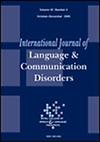What Factors Contribute to the Motivation of Adults Who Stutter to Continue Their Treatment? A Qualitative Study
Abstract
Background
Stuttering is a chronic condition that requires long-term management. Previous research emphasizes that motivation plays a critical role in therapy success. Motivation is an intrinsic process that drives and directs behaviour, making it a key determinant in whether individuals continue or discontinue therapy.
Aims
This study aims to explore the factors influencing the motivation of adults who stutter to continue therapy, focusing on identifying themes and insights related to therapy continuation.
Methods and Procedures
A qualitative content analysis approach was used, involving 24 adults aged 30 to 40 who stutter. Participants were recruited through purposeful and snowball sampling from social media groups of the Iranian Stuttering Association and speech and language pathologists' platforms. Participants were divided into two groups: those who chose to continue their speech therapy (n = 11) and those who decided to discontinue it (n = 13). Data were collected through semi-structured, in-depth interviews conducted online, which were analysed using content analysis to identify themes and subthemes related to the motivation of continuing stuttering therapy.
Outcomes and Results
The study identified six key themes that influence motivation to continue therapy: therapist characteristics, therapy structure and process, therapeutic setting and tools, perceived treatment effectiveness, client psychological dynamics, and social support and perception. These themes played a critical role in shaping clients' motivation and their decision to persist in therapy.
Conclusions and Implications
This research underscores that a strong therapeutic alliance, along with supportive family and social environments, can enhance motivation by fulfilling basic psychological needs (autonomy, competence, and relatedness). These needs can be addressed by focusing on effective therapeutic interactions, minimizing ambiguity in the treatment process, designing tailored treatment plans based on each client's unique goals and circumstances, fostering active participation, and providing constructive feedback.
WHAT THIS PAPER ADDS
- Stuttering requires long-term management, and motivation is a critical factor influencing therapy continuity and outcomes. However, the specific factors that motivate adults who stutter to continue or discontinue therapy have not been extensively explored.
- This study identifies key themes influencing motivation for continuing or discontinuing stuttering therapy, including individualized treatment plans, therapist characteristics, and supportive environments.
- The findings emphasize the importance of personalized treatment approaches, competent therapists, and supportive therapeutic environments in enhancing motivation to continue stuttering therapy. These insights can inform the development of more effective stuttering treatment programmes and support systems, fostering sustained engagement until clients achieve their therapy goals.

 求助内容:
求助内容: 应助结果提醒方式:
应助结果提醒方式:


